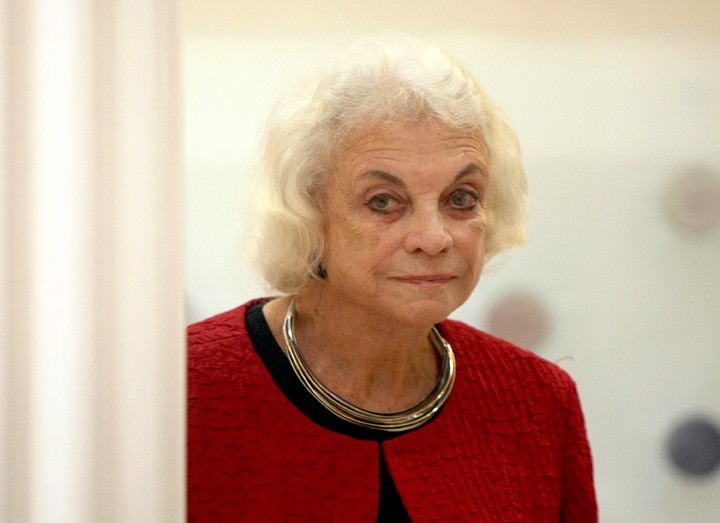It was 84 years ago this week that Ada Mae Day traveled 200 miles east to El Paso and gave birth to a baby girl named Sandra. Fifty-one years later, that baby grew up to become the first woman appointed to the U.S. Supreme Court.
The journey in between and after contained its fair share of obstacles, some of which Sandra Day O’Connor is expected to share in an interview with retired Arizona Supreme Court Chief Justice Stanley Feldman this Sunday night at the Fox Tucson Theatre.
In what is expected to be the first of many free events hosted by the Sunday Evening Forum, O’Connor is joining Feldman in an open discussion of her 24-year tenure on the U.S. Supreme Court and on the current climate of our nation’s judiciary system.
“She was a really great jurist who understood how to compromise and bring people together to make good changes,” said Anne Hameroff, a retired lawyer and board member of the Sunday Evening Forum. Hameroff said that topics such as women in law, judiciary independence and the presence of media in courtrooms will likely be discussed during the interview.
Since former President Ronald Reagan appointed O’Connor to the Court in 1981, she’s been a crucial swing vote in a number of high-profile cases concerning abortion, religious freedom, capital punishment and the presidential election of former President George W. Bush. O’Connor disregarded her lifelong ties to the Republican Party by siding with her more liberal-minded colleagues on numerous occasions.
The 2003 case of Grutter v. Bollinger had O’Connor tipping the majority in favor of the University of Michigan’s Law School in its fight to use a student’s race as a factor in their admissions process. Although, O’Connor remained loyal to her conservative allies, like Justices Clarence Thomas and Antonin Scalia, for about 90 percent of her voting decisions made up to 1997.
“They were all difficult,” O’Connor said when asked what her most difficult decision was while serving on the Court.
One of O’Connor’s earliest decisions, Mississippi University for Women v. Hogan, showed the justice’s commitment to defending gender equality when she voted in the majority of 5-4 to prevent the state’s nursing school from refusing the admittance of men.
O’Connor has experienced her fair share of sexual discrimination. After graduating in the top 10 percent of her class from Stanford Law School in 1952, her only job offer was for a secretarial position with the Los Angeles firm Gibson, Dunn & Crutcher. This didn’t stop the future Supreme Court Justice from serving her community, as after marrying her husband John and settling down in Phoenix, O’Connor was elected to the state Senate.
“While I think I served as an effective legislator, I was never ‘one of the boys,’” O’Connor said in her 2003 book “The Majesty of the Law.”
O’Connor holds the additional achievement of being the first woman to be chosen as majority leader in a state Legislature.
While working as a state senator in the early 1970s, O’Connor voted against an appropriations bill designed to expand the UA’s football stadium. According to an article published in the Phoenix Gazette, O’Connor objected to an antiabortion provision added to the bill, as she found it to be irrelevant to rest of the bill’s legislation.
Shortly after voting against this bill, O’Connor left the Legislature in 1974. She then worked as a judge in the Maricopa County Superior Court and the Arizona Court of Appeals. At the time of her appointment to the Supreme Court, she was the first justice with prior state legislature experience to be confirmed in 32 years.
Since O’Connor left the Supreme Court in 2006, President Barack Obama has appointed two other women to fill vacant seats. Along with Justice Ruth Ginsburg, Obama’s appointments of Sonia Sotomayor and Elena Kagan mark the most women to serve on the Court simultaneously.
Always defined by her pragmatic sense of the law, O’Connor will be interviewed on Sunday night by a man who apparently shares a similar philosophy.
“He’s a very idealistic person,” Hameroff said of retired state Justice Stanley Feldman, “but also a pragmatist.”
Hameroff spent her first year out of law school clerking for Feldman in the early 1990s.
Feldman is the recipient of the Lifetime Achievement Award from the James E. Rogers College of Law, which has a courtroom named in his honor, and the National Center for Victims of Crime Partners in Justice Award.
O’Connor and Feldman’s chat will also address submitted questions from the audience. Tickets to the event will be distributed at 4 p.m. on Sunday, and there are approximately 900 free seats available to the public. The doors to the theater will close at 6:25 p.m.









